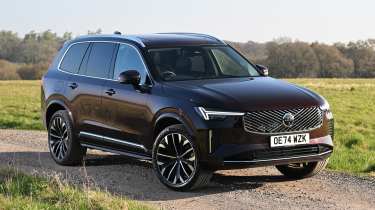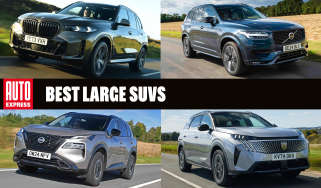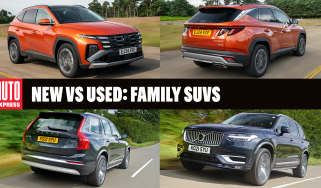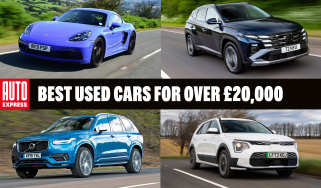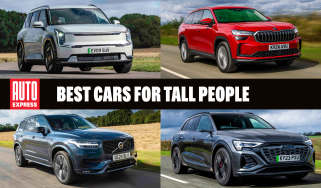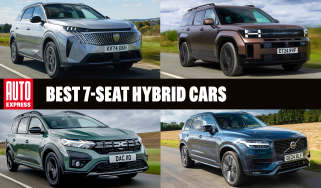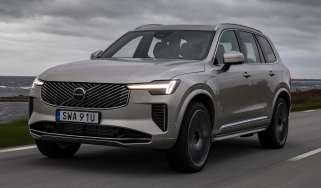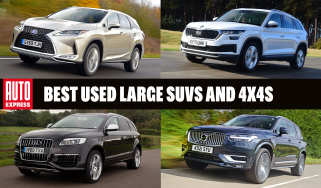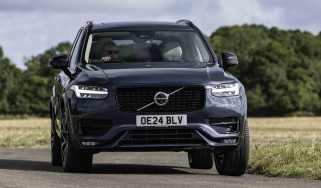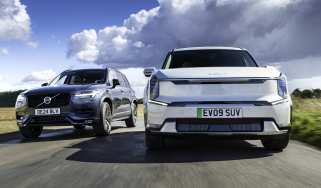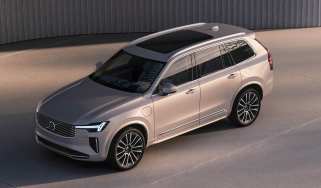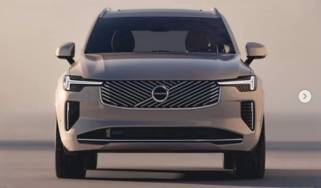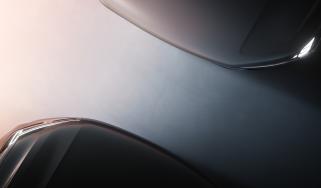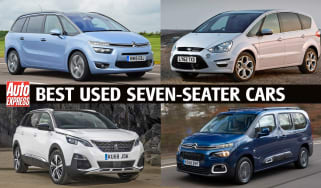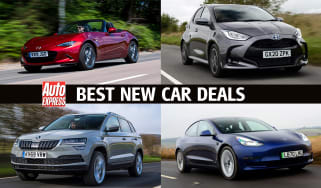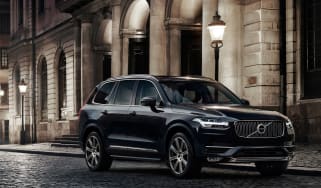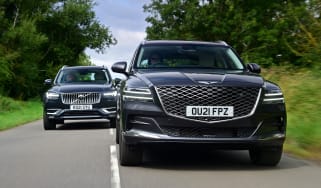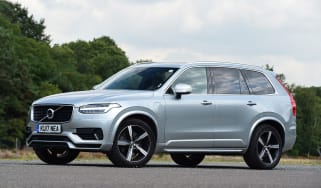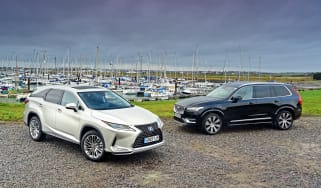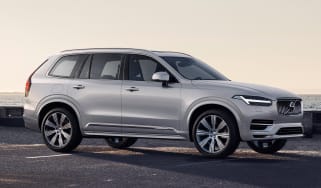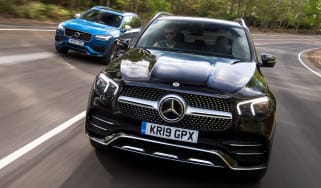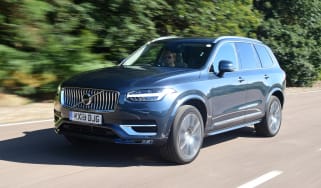Volvo XC90 review
Swedish Volvo XC90 SUV is still a strong contender after nine years on sale

Our opinion on the Volvo XC90
You know what you’re going to get with a Volvo – a solid, practical, safe and confidently understated type of premium car. Sure enough, that sums up the XC90 very efficiently. Better yet for the Swedish brand, it also tallies very well with the typical customer requirements in the large premium SUV class where the Volvo XC90 plies its trade.
The big seven-seat SUV is showing its age in places after over a decade on sale, but the 2024 facelift freshened things up nicely. The infotainment system is now a real strength alongside the practical, high-class cabin and easy-going driving experience. Neither the mild-hybrid nor the plug-in hybrid engine option is at the head of the class but the venerable Volvo is still a match for the likes of Audi’s Q7 and Land Rover’s Discovery.
| Key specs | |
| Fuel type | Petrol, PHEV |
| Body style | Large SUV |
| Powertrain | 2.0-litre turbocharged petrol, four-wheel drive 2.0-litre turbocharged petrol PHEV, four-wheel drive |
| Safety | 5-star Euro NCAP (2015 expired) |
| Warranty | 3yrs/60,000 miles |
About the Volvo XC90
Volvo launched this second-generation XC90 in 2014 and the large SUV is still going relatively strong. This is thanks in no small part to a sizeable package of updates delivered in 2024 that tinkered with the design, the driving experience and the infotainment system.
The XC90 is no longer the pinnacle of Volvo’s SUV range and now rests in the shadow of the EX90 electric SUV. That car, which uses a special electric-only version of the same Scalable Product Architecture (SPA) platform found beneath the XC90, is the source of the 11.2-inch screen running Google-based software that was such a big part of the refresh.
Used - available now
Prices for the Volvo XC90 start from around £64,000 and extend up to over £84,000 for the top-spec T8 plug-in hybrid. That just about overlaps with the cheapest version of the electric EX90, but buyers need to find more than £100,000 for a fully loaded one of those. Rivals are drawn from the ranks of other seven-seat premium SUVs, and the obvious ones are the Land Rover Discovery and Audi’s Q7. BMW’s X7 is more expensive but buyers may also be drawn towards the all-electric Kia EV9 as another interesting alternative for similar money.
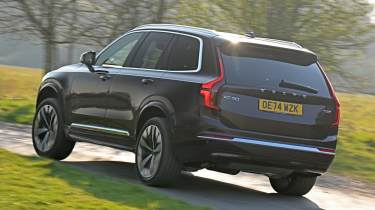
With seven comfortable, adult-sized seats as standard plus a big boot, the XC90 has long been a strong candidate for family car buyers, but the quality of the interior means it's more of a luxury choice than a family utility vehicle. It certainly feels a cut above top mainstream alternatives like the Hyundai Santa Fe or Skoda Kodiaq.
There are now two petrol power options, the T8 and the B5. The T8 Twin Engine powertrain is the flagship option, a plug-in hybrid arrangement that is widely used across the Volvo range. Volvo was one of the first big SUV makers to embrace ‘downsizing’ powertrains in pursuit of increased efficiency, and all the XC90 models feature a 2.0-litre engine under the bonnet - even the T8 with its hefty 449bhp maximum output.
The B5 uses mild-hybrid tech to help boost efficiency so you don’t need to plug in to recharge the batteries. The old B5 diesel has been dropped from the line-up. All XC90 models are all-wheel drive and have an eight-speed automatic gearbox with a manual mode. Hill descent and hill-start control are also fitted, although the Volvo is definitely more suited to Tarmac use than hardcore off-roading. All cars have automatic adaptive dampers as standard but higher-spec versions come with air suspension that softens the ride and can lower the car for easier exits.
The range of trim levels these days opens with Core before extending up to Plus for a £5,000 premium, and Ultra for another £7,000. All versions get the 11.2-inch touchscreen infotainment system, a wireless phone charging pad, matrix LED headlights, 19-inch alloys and heated seats in the front and middle rows. Even at this base level, the equipment list has most of the features you’d want and we’d recommend Core as the pick of the range for most buyers.
Plus models add the air suspension, 20-inch wheels and the panoramic sunroof ‘plus’ a Harman Kardon Premium Sound stereo upgrade. With Ultra you get a third and even fancier Bowers & Wilkins stereo, 21-inch wheels, massaging, ventilated front seats, and a 360-degree camera system.
Performance & driving experience
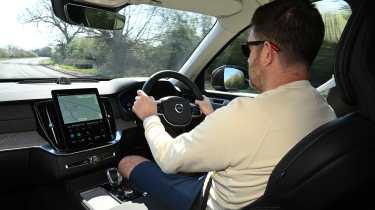
| Pros | Cons |
|
|
You can’t get a diesel XC90 these days, which is a shame because the fuel always suited the big Volvo well. It’s either the T8 plug-in hybrid, which is refined and powerful, especially when you’ve had the foresight to charge the battery, or the B5 mild hybrid. Generally, the car is easy to drive, hushed on the road and comfortable. No seven-seat SUV is particularly entertaining to drive and that applies here too. What the XC90 does a bit better than an Audi Q7 or a Land Rover Discovery is disguise its bulk, so you don’t feel like you’re driving a vehicle quite as large as it is.
Performance, 0-60mph acceleration and top speed
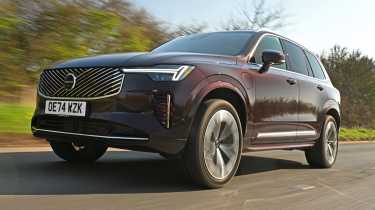
It’s the least powerful B5 mild-hybrid petrol we’d go for: a 2.0-litre turbocharged petrol engine that’s backed up by a modest electric boost that recovers some waste energy when slowing down. This can then be deployed under acceleration to remove some load (and therefore fuel usage) from the four-cylinder unit. With 247bhp and 360Nm of torque sent to all four wheels, it delivers strong acceleration, the 0-62mph sprint being dispatched in 7.7 seconds.
Those in more of a hurry can turn to the T8 PHEV. This gets a 306bhp version of the same petrol engine, plus an electric motor with 143bhp and 309Nm: enough for a total system output of 449bhp. That slashes the 0-62mph time to 5.4 seconds, but as with every new Volvo, the top speed is limited to 112mph.
Progress is fairly smooth in each car, but the B5 petrol engine can sound a little noisy when it’s worked hard. In the T8, the engine is virtually inaudible at normal speeds, even when the battery is empty. If you ask for full power, the transition between electric and petrol power can sometimes be a little abrupt.
Town driving, visibility and parking
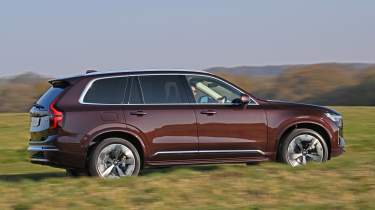
The XC90’s low-speed ride is at its best in the range-topping models fitted with the air-suspension system. It can soak up normal road imperfections very efficiently, and only the occasional bigger bumps transmit crashes and shudders into the cabin. We crawled through a number of rural villages on our test route and the Volvo feels easier to thread around parked cars on narrow streets than the likes of a Land Rover Discovery, helped by good all-round visibility.
On the standard suspension set-up, which uses traditional coil springs up front and composite leaf springs at the back, and features adaptive dampers that adjust to the road surface, the Volvo still remains comfortable. Even then, the sound of suspension knocks (and road noise in general) is well isolated from the occupants. The steering is very light, which brings benefits when parking, at which point the surround-view cameras on the higher-spec cars come in handy for piloting an SUV almost five metres long.
B-road driving and handling
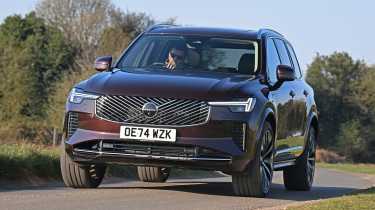
The light steering feels less positive as the speed increases and ultimately becomes a little too imprecise to inspire confidence in a car of this size, especially in conjunction with the floaty sensation created by the air springs. While this can be mitigated slightly by opting for a sportier steering mode, it doesn’t really improve things enough to encourage sporty driving in the XC90. Neither do the high centre of gravity and nose-heavy attitude. It’s best to just take a much more relaxed approach on B-roads, but that’s true of almost all seven-seat SUVs.
Motorway driving and long-distance comfort
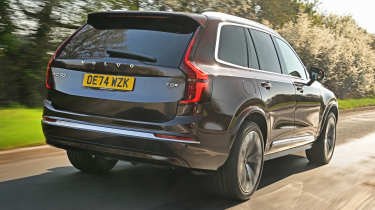
That ride comfort is shown in its best light on a motorway, where the XC90 is a very relaxing place for seven people (and their belongings) to while away the miles.
Aside from a small rustle from the door mirrors, wind noise is well contained, and the engine note is considerably calmer than it is when under load. There was suspension noise over motorway expansion joints on our test route, but few actual jolts made their way past the air suspension into the cabin, even on the 21-inch wheels. Once again, a little more precision from the steering would make the Volvo feel more planted, but that’s only a minor criticism when at a cruise.
| Model | Power | 0-62mph | Top speed |
| Volvo XC90 B5 | 247bhp | 7.7 seconds | 112mph |
| Volvo XC90 T8 | 449bhp | 5.4 seconds | 112mph |
Expert view, on driving experience
“The Volvo isn’t the last word in driving engagement – a BMW X5 is far more planted – but the XC90 doesn’t feel lost when it encounters a corner.” - Alastair Crooks, senior news reporter, who tested the facelifted Volvo XC90 T8 on the international launch in Sweden.
MPG & running costs
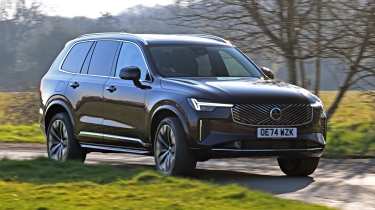
| Pros | Cons |
|
|
Officially, the XC90 B5 mild hybrid will achieve up to 32.1mpg on the combined cycle, but this was a number that we found difficult to match in the real world. It’s a figure that will only get worse with a full complement of passengers on board, so it’s best to set aside a generous budget for frequent petrol stops.
That said, the petrol model is still where our money would go in the range. The plug-in hybrid offers financial benefits for company-car users in terms of Benefit-in-Kind (BiK) taxation, but for everyone else, it’s harder to justify.
Even if the PHEV is charged religiously at home, it will still take a very long time before the benefits in running costs start to offset the extra £9,000 you’ll have to pay at the time of purchase. Without that regular charging, it makes an already inefficient petrol engine even more thirsty.
Electric range, battery life and charge time
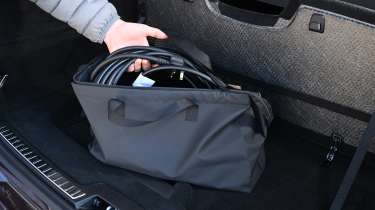
The Volvo XC90 T8 plug-in hybrid (PHEV) uses an 18.8kWh battery pack, which officially should enable a range of roughly 44 miles in pure-electric mode. That’s not the best figure for the latest batch of plug-in hybrids, but there are few seven-seaters that offer the technology. On our tests we were able to get between 32 and 35mpg from the T8 with a flat battery, which underlines the importance of regular charging to keep the costs down.
With 6.4kW charging, the T8 can recover its charge from a typical home wallbox in around five hours. The PHEV still gets a generous 71-litre fuel tank, too – smart packaging of that big battery pack means that it has done little to compromise the amount of fossil fuel the XC90 can cram on board or the amount of cabin space.
| Model | Battery size | Range | Insurance group |
| Volvo XC90 B5 | 32.1mpg | 199g/km | 36 |
| Volvo XC90 T8 | 217.3mpg | 30g/km | 41 |
Insurance groups
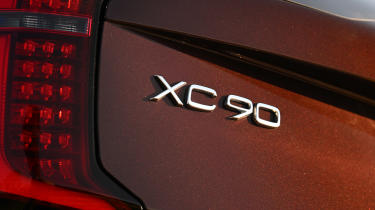
Volvo’s reputation for safety plays a part in insurance groups that aren’t as steep as you might expect for a 60-grand-plus SUV. The Core mild-hybrid model kicks things off from group 37, while the top-spec T8 PHEV, despite its strong performance, only climbs six groups to 43.
Tax
As a big SUV that comfortably exceeds the £40,000 mark, the XC90 is subject to a £425 Vehicle excise duty (VED) surcharge. That means every model in the line-up costs £620 a year to tax from the second year until the sixth year. It’s £195 per year after that.
Depreciation
Depending on trim level and powertrain, the XC90 is predicted to hold onto between 47 and 53 per cent of its original value after three years or 36,000 miles. The plug-in hybrid T8 models perform slightly better than the mild-hybrid B5 cars.
While those residual values are a match for the Audi Q7, they’re not as good as the Land Rover Discovery’s, which can retain as much as 63 per cent over the same period and mileage.
To get an accurate valuation for a Volvo XC90, check out our valuation tool...
Interior, design & technology
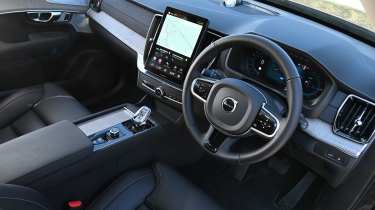
| Pros | Cons |
|
|
Volvo says there are Scandinavian influences everywhere in the XC90, such as the brand’s now signature T-shaped ‘Thor’s Hammer’ daytime running lights. The narrow lightbars give the XC90 an aggressive glare, helped by its deep front bumper and bluff radiator grille that gained diagonal slats in the most recent facelift.
The Volvo’s interior design has aged extremely gracefully, and it manages to do a reasonable (if not perfect) job of mixing touch-sensitive controls and physical buttons. Few cars of the XC90’s age manage to feel as modern as it does next to the competition, and that’s tribute to the designers.
Interior and dashboard design
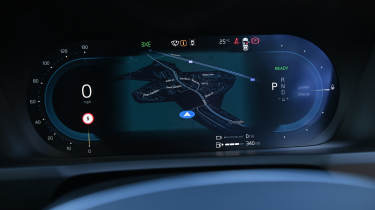
Even over 10 years on from its launch, the XC90 is still a wonderful place to sit. It’s at its best in top-spec Ultra form, where leather trim on the dashboard and the use of differing shades of materials and open-pore woods give a uniquely Swedish vibe that manages to feel hi-tech yet relaxing, and posh without being ostentatious.
You can get a one-litre water bottle or a large coffee cup in both of the central cup-holders and the bottle can be dropped into the wide door pockets as well. Under the central arm rest, the space isn’t particularly deep, but there are charging points for plugging your devices in as an alternative to the wireless charging pad under the central screen.
Materials and build quality
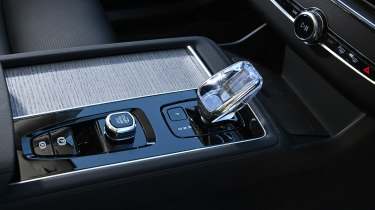
Everything feels solid and sturdy inside the XC90. The window switches and column stalks are suitably chunky, and most of the materials feel very high-end. We like the thick-rimmed steering wheel and the transparent drive mode selector that looks like a giant uncut diamond. When hard plastic does appear, it tends to be found lower down in the footwells, where it’s not really an issue anyway.
The materials get better as you ascend the trim level range, but the vibe is always quite cool and understated. The possible exception is the flashy metallic speaker covers for the Bowers and Wilkins stereo on the Ultra models but the sound they emit more than justifies this.
Infotainment, sat-nav and stereo
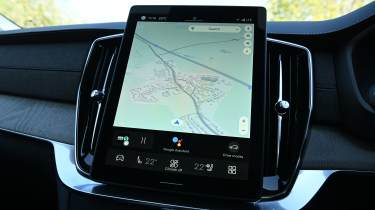
A digital instrument panel is standard throughout the range. It’s not particularly high-resolution compared with the class leaders, and there’s much less scope for rearranging the layout than you’ll find in an Audi Q7, for example. You either have a map in the centre of the display or a black space, but in typical Volvo style, the information is all displayed clearly and concisely with minimum fuss.
Infotainment is a hugely important part of the user experience in modern cars and it’s fair to say that the XC90’s system was feeling a bit dated. That changed with the 2024 update, which introduced a larger 11.2-inch portrait touchscreen to the centre of the dash. It’s less well integrated than the old smaller unit, looking more like a glued-on tablet, but it’s far superior from a user’s perspective with its Android Automotive-based interface.
The crucial thing with the system is that Volvo has kept the on-screen buttons nice and large with fixed shortcuts to key vehicle controls and your most-used apps. There’s no doubt that Android phone users will find it more intuitive than those familiar with Apple but wireless Apple CarPlay is also there as a back-up option. You can switch to the car’s settings and configure the drivetrain (in the T8 PHEV) or turn off the safety aids with one press on a large icon – a simple thing but also a hurdle over which so many cars stumble.
Volvo also retains physical buttons outside the touchscreen for key functions. There’s a tactile knob for the volume that feels great to turn, and buttons to demist the front and rear screens. The climate control functions are all inside the touchscreen, however, unless you count the panel for back-seat passengers.
Those with Google accounts (which is probably most of us these days) can also log in and access previous destinations stored in other devices, as well as use the Google Play Store to download car-friendly Android apps, such as Spotify.
Expert view, on design
“I like the way the XC90 is a little less ostentatious than some of its large SUV rivals. It certainly doesn’t have the imposing road presence of big SUVs from Land Rover or BMW and many people will prefer it that way.” - Steve Walker, head of digital content, who tested the XC90 in Oxfordshire.
Boot space & practicality

| Pros | Cons |
|
|
The interior and boot space of the Volvo XC90 have always been strong points, and very few rivals that have arrived since this car was launched have managed to significantly improve on either.
| Dimensions | |
| Length | 4,953mm |
| Width | 2,008mm |
| Height | 1,776mm |
| Number of seats | 7 |
| Boot space | 302/680/1,856 litres (7/5/2 seat layouts) |
Dimensions and size
The Volvo XC90 is a very big car, at 4,953mm from nose to tail. However, the Audi Q7 and Land Rover Discovery are even larger. The XC90's shape is essentially boxy and practical, unlike more overtly ‘rakish’ rivals such as the Audi Q7, and this shows when you get the tape measure out.
With a 1,776mm roof height, the Volvo XC90 stands tall against the 1,762mm BMW X5 (both without roof bars), and falls in-between the 1,737mm-high Audi Q7 and 1,796mm Mercedes GLE, both of which have standard-fit roof bars.
Driving position, seats & space in the front
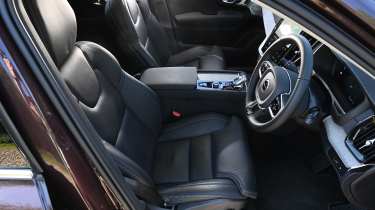
A typically high SUV driving position gives the XC90 driver a commanding view of the road ahead, and the large glass area all round means that visibility is reasonable for such a large car - although rear visibility is restricted when you have occupants in the third row. The front seats are very wide and comfortable, offering lots of adjustment to suit a wide range of body types, but there’s not a huge amount of side support.
Seats & space in the back
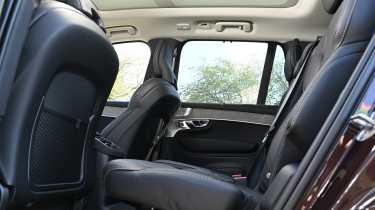
Middle-row passengers get similarly comfortable seats to those sitting up front. Both knee room and headroom are decent, even when the seats in the middle row are moved forward to make more space for those sitting in the very back. There is space under all the seats in the XC90 to put your feet, which helps make the most of the space.
The middle chair in the second row is slightly narrower and firmer than those on the outside, but it’s more accommodating than many similar seats in rival SUVs. Manual sun blinds in the rear doors are standard on all trims except the base Core model, where they’re an option.
Move a row back and things are still reasonably spacious. The middle row folds and slides forward to improve access, and the stadium-style seating places those right at the back a touch higher than the occupants ahead to give a slightly better view out. It’s good that all occupants get proper headrests, too.
There’s not a lot of floor space to put your feet when clambering into the rear and we found it easier to go in backwards and plonk yourself in the chair. Just be careful not to clonk your backside on the protruding cup-holders. We managed to fit six-foot-tall adults in the middle and back rows behind a driver and passenger of a similar size. Space was a little tight but it’s proof that this is a seven-seater that really can cope with seven adults.
Those back seats get air vents and a storage bin, but unlike rivals such as the Kia EV9, no USB ports. Also slightly disappointing for a car of this size is that the XC90 gets just two Isofix points; an EV9 has four, and an Audi Q7 has five.
Boot space
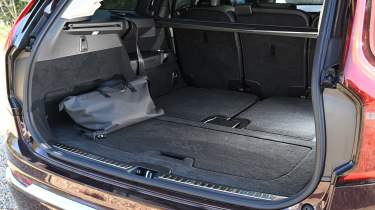
Even with all seven seats in place, the XC90 offers 302 litres of boot capacity. The third row of seats folds down easily and completely flat (albeit manually, unlike the electric seats of some alternative models) to expand that volume up to 680 litres at the window line. When configured in two-seat mode, the XC90 offers a vast 1,856 litres of load space to the roof.
On our test we found that the seats can occasionally get jammed and require a bit of wiggling to get them to slide and fold. They do feel very sturdy, however. The XC90’s boot divider and tethering hooks prove to be very useful when securing slightly smaller items to prevent them from moving. You’ll also need the tether points to secure the little hold-all bag Volvo supplies to store the T8’s charging cable, because there’s no dedicated cable storage.
Towing
When it comes to hauling a trailer, the XC90 is a decent performer. The Volvo is rated to tow up to 2,400kg in T8 PHEV guise – this compares favourably against the wave of electric seven-seat SUVs, led by the Kia EV9, which only has a 900kg limit in rear-wheel-drive form (2,500kg with four-wheel drive). The mild-hybrid petrol XC90 B5 can tow 2,400kg. To make the most of this ability, Volvo offers a foldable towbar as an option.
Few SUVs can match a Land Rover Discovery; a maximum towing limit of 3,500kg, plus the hefty 700Nm of torque from the D350 diesel mild-hybrid engine, makes it a better option than either when it comes to pulling power.
Expert view, on practicality
“The heated front and middle-row seats, along with the heated steering wheel, deserve a mention because they’re designed to work in the Arctic circle, and get up to temperature incredibly quickly” - Alastair Crooks, senior news reporter, who tested the facelifted Volvo XC90 T8 on the international launch in Sweden.
Reliability & safety
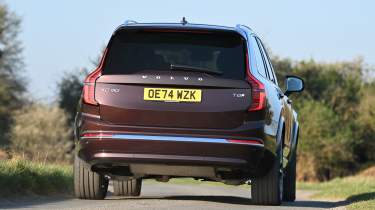
| Pros | Cons |
|
|
The Volvo XC90 was assessed by Euro NCAP in 2015, shortly after it was launched. At the time it was considered one of the safest cars the organisation had ever tested, with a 97 per cent score in the Adult Occupant Protection category, but due to NCAP’s standards growing ever-more stringent, it no longer considers ratings of this age to be valid.
That doesn’t make the XC90 an unsafe choice, because it still comes with all the passive and active safety-assistance technology you’d expect of a luxury SUV. Two pieces of tech made their debut in the XC90: a Run Off-Road system that senses if you veer off the tarmac – preparing the car for a crash – and special energy-absorbent seats that’ll reduce the impact of a big hit.
There’s also a clever autonomous braking system (AEB), which stops you turning in front of an oncoming car. This is part of Volvo’s enhanced City Safety package, which also helps protect against collisions with motorcycles, swerving bicycles or errant pedestrians.
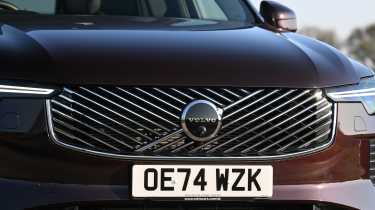
Our experience of the XC90’s safety aids was generally positive. The automatic braking systems didn’t seem to be too easily triggered by parked cars on the outside of bends or vehicles passing as you reverse out of driveways. The blind-spot monitoring tech spotted a decrepit Porsche Boxster accelerating fast up a motorway slip road’s outside lane behind us and steered the XC90 firmly away from danger. It wasn’t even a near miss but the safety aids do seem to react in a more predictable and helpful way than in a lot of cars.
Up until recently, the Volvo brand had been steadily rising up through the rankings in our Driver Power owner satisfaction survey, but it has dropped down from 13th in our 2023 survey to 16th out of 32 manufacturers in the 2024 results. That puts it below BMW in 14th, and above Mercedes in 25th.
| Key standard safety features | Euro NCAP safety ratings |
|
|
Buying and owning
- Best buy: Volvo XC90 B5 Core
You can’t go wrong with an XC90 in entry-level Core trim, because it’s pretty well equipped and upgrading to Plus or Ultimate specs adds larger wheels that can spoil the car’s ride comfort. We’d only recommend the T8 PHEV if you’re able to plug it in and make use of its electric range, otherwise you’re relying on a petrol engine to haul along a large, heavy SUV, so fuel economy will take a hit.
Alternatives
As a luxury SUV that sits almost at the top of Volvo’s range, the XC90 naturally rivals cars such as the Audi Q7, BMW X5, BMW X7, Lexus RX, Genesis GV80, Porsche Cayenne and Range Rover Sport. However, the XC90 comes with seven full-size seats as standard, so it also competes with the more family-friendly cars such as the Land Rover Defender, Land Rover Discovery, Kia Sorento and Hyundai Santa Fe. If you’re willing to go electric, then the Kia EV9 is another rival.
Volvo XC90 pictures
Used and nearly new
Spacious, comfortable and classy, it isn't hard to see why the Volvo XC90 was such a big hit when it was launched in 2002. The Scandinavian seven-seater had all the qualities to fit in with family life, and excelled on longer journeys where its spacious interior and superb refinement made for a relaxing drive.
Older examples are showing their age now, while running costs might be an issue for some. Second-generation models offer a touch of premium luxury and excellent standard safety kit but, as ever, be sure to do your homework on the history of your potential purchase - taking extra time to ensure your used buy is rock solid could help prevent spending on repairs further down the line.
Volvo XC90 history
The XC90 arrived at the height of the premium SUV boom in the early noughties and provided genuine competition to the established, and mostly German, competition.
Volvo XC90 Mk2: 2014-date
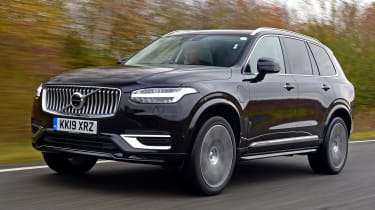
Volvo did a great job with its second-generation XC90, dialling up the luxury, refinement and safety credentials of its large SUV. Petrol, diesel and plug-in hybrid models are available, although you'll have to look out for a model from late 2015 onwards to secure a sporty R Design version - the Mk2 XC90 was initially launched with just Momentum and top-of-the-range Inscription trim levels. The 2024 facelift brought a new line-up of trim levels (Core, Plus and Ultra), a modest restyle and improved infotainment to match the system on Volvo’s EX90 electric model.
There have been numerous manufacturer recalls for the latest XC90, so be sure to check all the necessary maintenance work has been carried out before any purchase. Read our full Mk2 Volvo XC90 buyer’s guide here…
Volvo XC90 Mk1: 2002-2014
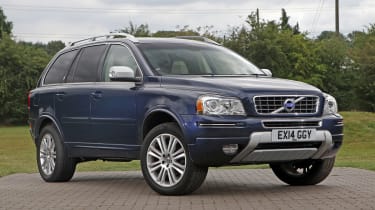
If you're after a big, comfortable, seven-seat SUV, then the Mk1 XC90 is hard to beat. Admittedly, time has caught up with Volvo's family 4x4, but despite dated styling and reasonably high running costs, it still offers good practicality and will easily accommodate a large family and luggage.
Facelifted models were introduced in 2006 and 2012, adding improved cabin materials, new engines and a revised infotainment system. Read our full Mk1 Volvo XC90 buyer’s guide here…
Frequently Asked Questions
All Volvos come with a three-year, 60,000-mile warranty, plus three years of breakdown cover. That matches Audi’s package, while Land Rover provides three-year, unlimited-mileage coverage and three years of breakdown assistance. Leading the class is the Kia EV9, which has a seven-year, 100,000-mile warranty, but only a year’s breakdown cover.
More reviews
Car group tests
Road tests
Used car tests
Which Is Best
Most Economical
- Name2.0 T8 [455] RC PHEV Core Bright 5dr AWD Gtron
- Gearbox typeSemi-auto
- RRP£71,995





